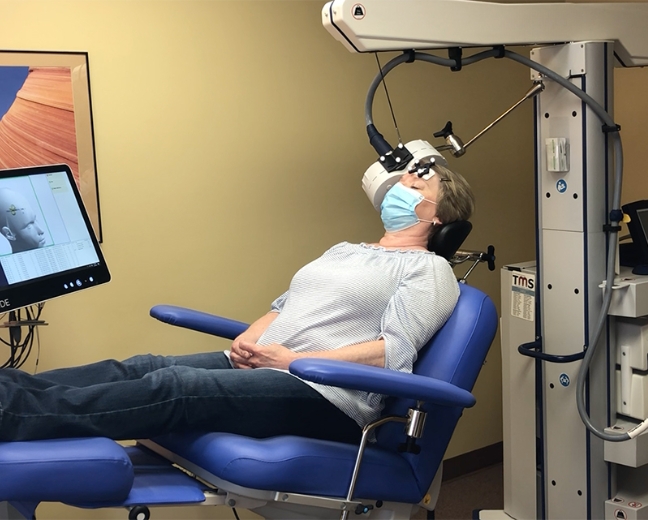Deep TMS and TMS are approved for treating major depressive disorders. They are safe, non-invasive alternatives for MDD patients who have not responded to medication. Deep TMS treatment lasts 6 weeks and includes 30–40 outpatient sessions (18–36 minutes each, depending on your issue). Deep TMS is safe with no long-term negative effects. This treatment does not involve anesthesia or sedation, as the patient stays awake and alert. Deep TMS near you is a non-systemic treatment that is FDA-approved for those with serious depression, anxiety, OCD, and smoking cessation who do not respond to prescription treatment.
Deep TMS Treatment Benefits
Following are the benefits of Deep TMS:
- Non-invasive. Patients won’t have skull electrodes like in DBS. Instead, a magnetic helmet will conduct the work non-invasively.
- Needs no anesthesia. The patient can drive himself to and from appointments, making treatment as convenient as therapy and without grogginess.
- No hospital stays or gowns: In TMS center in Dallas, therapy of Deep TMS allows patients to go home and sleep in their beds when finished. Additionally, patients can wear their regular attire during appointments. Remove hats and spectacles at the entry.
- Zero systemic effects: Deep TMS targets precisely. Patients don’t have to worry about weight gain or pharmaceutical side effects like hair loss, diarrhea, sexual dysfunction, and others.
- Treatment is quick! For OCD and depression, 20–30 treatments over 4-6 weeks should work. Within 20 sessions, most OCD patients improved in clinical tests.
- Effective treatments are improving. Researchers predict Deep TMS will be effective with fewer sessions in the future decade. Future sessions may be as brief as 3-5 minutes, and all therapy sessions may fit into one week.
Possible Side Effects
- Deep TMS therapy near you is usually safe, but it can sometimes be harmful. Some of these are mild pain at the treatment site, tingling on the scalp, headaches, and feeling lost during or after the session. Most side effects only last a short time, but they need to be treated and watched over. Along with the bad effects, deep TMS treatment may temporarily change the way you sleep.
- They may have trouble falling or staying asleep, affecting their health. Healthcare practitioners should explain these effects to patients to prepare them for treatment.
- Deep TMS therapy has potential, but its limitations must be acknowledged. Its efficacy and suitability vary by person and mental health state. Considering individual circumstances and consulting with healthcare professionals is essential to choosing the best treatment.
- Deep TMS therapy’s long-term effects on mental health issues are still being explored, and more research is needed to determine its pros and cons. Researchers, physicians, and patients must work together to collect evidence on deep TMS therapy’s efficacy across a variety of psychiatric diseases to improve treatment outcomes for people seeking alternative therapies.
Medication vs. Deep TMS
Deep TMS does not require systemic drugs. This prevents major drug interactions and systemic negative effects. Deep TMS is also non-pharmacological, making it appealing to non-drug users. Mental health medications can cause weight gain, sexual dysfunction, and gastrointestinal issues. Mentally ill people may find these side effects burdensome. Non-pharmacological deep TMS therapy avoids these side effects, making it more bearable for many patients.jo g
Deep TMS near me may work when medicine fails or is poorly tolerated. Deep TMS therapy may help people who have had bad drug reactions or unbearable side effects. An effective treatment for OCD, MDD, and anxiety is now available. TMS is deep transcranial magnetic stimulation. Not as complicated as it sounds, deep TMS. This
FDA-approved treatment involves wearing a coil-equipped helmet. This coil stimulates neuron activity in specific brain regions with magnetic waves.
Differences Between TMS and Deep TMS
TMS and deep TMS differ in mental health treatment because:
- Coil-type: Deep TMS uses an H-shaped helmet-mounted coil, while regular TMS uses a figure 8 coil.
- Depth of magnetic stimulation: Transcranial magnetic stimulation pulses reach 0.27 inches and deep magnetic stimulation 1.25 inches.
- Session length: Deep TMS typically lasts 4-6 weeks, or 20 minutes per session.
Conclusion
Deep TMS therapy is a non-invasive, drug-free treatment for depression, anxiety, OCD, PTSD, and addiction. This therapy stimulates brain regions with magnetic pulses to release neurotransmitters and balance neuronal networks. Therapeutic deep TMS near me has many benefits for mental patients. The procedure is painless and doesn’t need any kind of anesthesia or sedation. It avoids side effects by not using medicine. Thirdly, it works for people who haven’t reacted to medicine or talk therapy.

